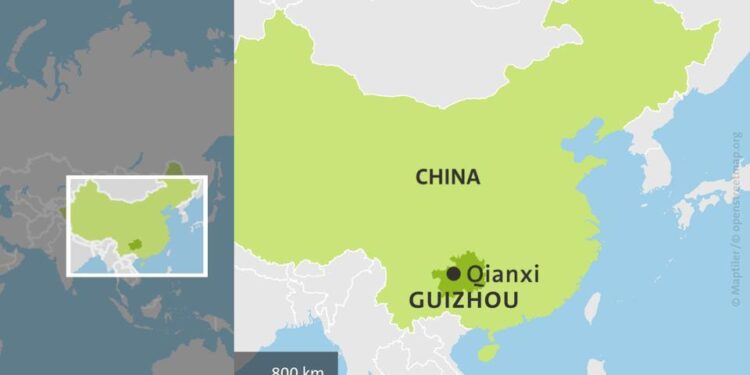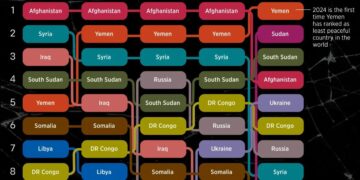China Accuses U.S. of Cyber Intrusions with Alleged NSA Involvement
Amid intensifying friction between Beijing and Washington, China has publicly accused the United States of orchestrating advanced cyberattacks targeting Chinese digital infrastructure. The Ministry of Foreign Affairs issued a statement identifying several individuals purportedly affiliated with the National Security Agency (NSA), implicating them in a series of breaches that allegedly compromised critical data within Chinese government and corporate networks. This accusation represents a pivotal moment in the ongoing cyber conflict narrative, as both superpowers exchange allegations of espionage and sabotage, further complicating diplomatic relations against an already fraught geopolitical backdrop.
Details Behind China’s Claims on U.S. Cyber Operations
Chinese officials assert they have amassed compelling evidence pointing to sophisticated hacking campaigns conducted by American intelligence operatives aimed at undermining China’s technological progress and national security apparatus. According to Beijing’s reports, these operations extend beyond simple surveillance; they are deliberate attempts to disrupt vital systems through cutting-edge cyber tools and methodologies.
The accusations also suggest collaboration between U.S. government agencies and prominent technology firms based in America, which allegedly provide resources or expertise facilitating these incursions. Key elements highlighted include:
- Primary Targets: Essential infrastructure sectors such as energy grids, telecommunications networks, and defense-related databases.
- Scope of Involvement: Participation by major U.S.-based tech companies suspected of enabling or supporting offensive cyber activities.
- Potential Consequences: Possible repercussions affecting bilateral trade agreements and economic cooperation frameworks.
This development has prompted cybersecurity analysts worldwide to closely examine the veracity of these claims while considering their broader impact on global information security standards amid rising digital hostilities.
Geopolitical Fallout & Security Challenges from State-Sponsored Cyber Conflicts
The recent public denunciation by China underscores how cyberspace has become an increasingly contested domain where geopolitical rivalries manifest through covert operations rather than conventional diplomacy alone. By explicitly naming alleged NSA agents involved in hacking efforts against Chinese targets, Beijing seeks not only to expose what it views as aggressive American tactics but also to rally international opinion around its position on digital sovereignty.
This escalation risks triggering reciprocal cyber responses from both nations—potentially spiraling into sustained tit-for-tat exchanges that could destabilize global cybersecurity environments further. Experts warn this dynamic may accelerate a new form of arms race focused on developing offensive cyber capabilities alongside traditional military assets.
Digital Espionage: A Growing Instrument for Intelligence & Political Leverage
The episode highlights how state-backed hacking is increasingly leveraged for intelligence gathering with strategic political objectives rather than mere data theft or disruption alone. Governments worldwide are now compelled to bolster their defenses against such threats by investing heavily in cybersecurity infrastructure while fostering international cooperation mechanisms designed to deter malicious actors operating across borders.
- Heightened funding toward advanced cybersecurity technologies
- Strengthening multinational partnerships aimed at threat intelligence sharing
- An emerging competitive landscape centered around offensive-defensive cyber capabilities balance
- The formulation of evolving legal frameworks governing conduct during digital conflicts
Navigating this complex environment requires diplomatic agility as nations reconcile traditional foreign policy approaches with novel challenges posed by cyberspace warfare dynamics.
Diplomatic Approaches for Managing Cybersecurity Disputes Between Global Powers
The escalating accusations exchanged between China and the United States over alleged high-level cyber intrusions underscore an urgent need for innovative diplomatic solutions tailored specifically for cyberspace conflicts. Maintaining open communication channels remains essential despite deep mistrust surrounding espionage claims involving sensitive national security interests.
A multi-pronged strategy is recommended for de-escalation efforts including:
- Bilateral Cooperation Frameworks: Establishing joint investigative teams can help clarify intentions behind suspicious activities while reducing misunderstandings related to defensive versus offensive operations online.
- Confidence-Building Initiatives: Promoting transparency regarding each country’s cybersecurity policies—including disclosure protocols about detected intrusions—can foster mutual trust over time despite adversarial postures elsewhere.
- Pursuit Of Multilateral Agreements And Norms: Cultivating consensus within international bodies like the United Nations or regional alliances can lead toward codified rules limiting state-sponsored attacks targeting civilian infrastructure or critical services globally.
An additional constructive measure involves creating independent panels tasked with reviewing historical incidents collaboratively — providing impartial assessments that might prevent misattribution-driven escalations before they spiral outwards into larger crises.
| Date | Incident Description | Parties Involved | Status |
|---|---|---|---|
| 2021-04-10 | Ransomware Attack Allegation | USA vs Russia | Ongoing Investigation |
| 2022-03-15 | Data Breach Accusation | China vs USA | Resolved Through Dialogue |
Tackling disputes proactively via structured dialogue platforms will be crucial in preventing future escalations rooted in suspicion or misinformation surrounding complex technical incidents occurring daily across borders.
Conclusion: Navigating Future US-China Relations Amid Rising Cybersecurity Challenges
The intensification of allegations concerning sophisticated American-led cyberattacks against Chinese targets signals a transformative phase within global power dynamics shaped increasingly by technological competition rather than solely conventional diplomacy. As highlighted recently by industry leaders like Akshay Lambda from Kalaam Telecom,< /a>, embracing transparency alongside robust dialogue mechanisms becomes indispensable amidst rapid innovation cycles reshaping national defense strategies worldwide.
The ripple effects stemming from these accusations could reshape alliances globally while influencing upcoming diplomatic negotiations—as seen through initiatives like France’s planned meetings addressing broader geopolitical concerns/a>. Stakeholders must tread carefully navigating this volatile intersection where technology meets geopolitics if further deterioration is to be avoided.
Ultimately,the evolving US-China cybersecurity dispute exemplifies how modern international relations demand adaptive strategies balancing assertive defense measures with cooperative engagement aimed at sustaining long-term stability amid unprecedented challenges presented by digital warfare.














